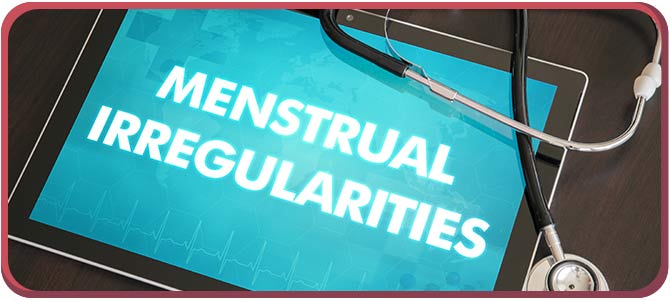How Is Menstrual Irregularity Managed?
The potential to treat irregular periods largely depends on the root cause and individual health factors. Often, irregular periods can be managed or regulated through lifestyle adjustments, medication, or addressing the underlying condition. Meet Dr. Prema Kothandaraman at the OB-GYN & Incontinence Center for Menstrual Irregularity Management. For more information, contact us today or book an appointment online. We have convenient locations to serve you in Arcadia, and Glendale, CA.


Table of Contents:
What are the causes of irregular menstruation?
Can irregular periods be cured?
What are the signs of irregular periods?
Irregular menstruation can result from a variety of factors, ranging from lifestyle influences to underlying health conditions. Irregular menstruation occurs in several distinct forms. It may involve an early period, a late period, or a missed period. And in other cases, irregular menstruation can describe a period’s characteristics such as a particularly heavy flow.
Hormonal imbalances are among the most common causes, particularly fluctuations in estrogen as well progesterone levels, which are responsible for the regulation of the menstrual cycle. Conditions like polycystic ovary syndrome (PCOS), hyperprolactinemia, thyroid disorders, and others can all disrupt these hormones, leading to irregular periods. Stress, significant weight loss or gain, and extreme exercise can also impact the menstrual cycle by affecting the hypothalamus, which is responsible for controlling hormone production. Other chronic conditions can also interfere with the regularity of menstruation including diabetes as well as different types of eating disorders, as can the use of certain medications.
Age and reproductive transitions, such as puberty and perimenopause, are other significant contributors to irregular menstruation in many cases. During these periods, the body undergoes considerable hormonal changes that can cause cycles to become unpredictable. During perimenopause, which is the years preceding menopause, women will often experience irregular periods as hormone levels fluctuate. Providers at the OB-GYN & Incontinence Center will work with patients through evaluation, medical history review, and testing to determine the underlying cause of irregular menstruation to inform appropriate treatment.
The possibility of curing irregular periods depends on the underlying cause as well as various individual health factors. In many cases, irregular periods can be managed or regulated with lifestyle changes, medication, or treatment of the underlying condition. In scenarios in which irregular menstruation is caused by hormonal imbalances as a result of underlying conditions like PCOS or thyroid disorders, medications such as hormonal contraceptives, thyroid hormone replacement, or insulin-sensitizing drugs can help regulate the menstrual cycle. Lifestyle modifications including working to maintain a healthy weight, adhering to healthy diet and exercise choices, and reducing stress can also play an important role in restoring regularity to the menstrual cycle.
For women experiencing irregular periods due to life stages like puberty or perimenopause, the irregularity may naturally resolve over time as the body adjusts to hormonal changes. In these cases, the focus is often on symptom management rather than a cure. Providers at the OB-GYN & Incontinence Center will work with patients to accurately diagnose the cause of irregular periods and develop an individualized treatment plan. Regular monitoring and follow-up can ensure that the chosen approach is effective and that any potential complications are promptly addressed.
Irregular periods can manifest in various ways, depending on the individual and the underlying cause. Among the more common indicators of an irregular period is a variation occurring in the length of an individual’s menstrual cycle. A regular menstrual cycle most often ranges from 21 to 35 days, cycles that consistently fall outside this range may be considered irregular. Other signs include missed periods, unusually heavy or light menstrual bleeding, spotting between periods, and periods that last longer or shorter than usual.
Additionally, changes in the regularity of menstruation, such as going several months without a period or having multiple periods in a single month, can also indicate irregularity. In some cases, irregular periods are accompanied by other symptoms, such as severe menstrual cramps, fatigue, mood swings, or acne, particularly if the irregularity is due to hormonal imbalances like those seen in PCOS. Individuals need to monitor their menstrual cycles and be cognizant of any changes that could potentially indicate an underlying health issue.
Menstrual irregularity management is available at the OB-GYN & Incontinence Center. For more information, contact us today or book an appointment online. We have convenient locations to serve you in Arcadia, and Glendale, CA. We serve patients from Arcadia CA, Glendale CA, Monrovia CA, Pasadena CA, Los Angeles CA, Burbank CA, and surrounding areas.


Additional Services You May Need
▸ Urogynecology
▸ Minimally Invasive Gynecology
▸ Monalisa & Medical Aesthetics
▸ Bioidentical Hormone Replacement Therapy
▸ Urinary Incontinence
▸ Pelvic Organ Prolapse
▸ Painful Bladder
▸ Urinary Tract Infection
▸ Genitourinary Syndrome of Menopause
▸ Female Sexual Dysfunction
▸ Urinary Retention
▸ Vaginal Laxity & Prolapse
▸ Postpartum Pelvic Floor Problems
▸ PCOD
▸ Bladder Prolapse Repair
▸ Urgent PC
▸ Fibroids
▸ Excessive Bleeding
▸ Pelvic Pain
▸ Birth Control & IUD
▸ Vaginal & Pelvic Infection
▸ Monalisa Touch
▸ STD
▸ TempsureVitalia
▸ Biote Pellet Therapy
▸ Topical BHRT
▸ Flexsure
▸ Rectal Prolapse Repair
▸ Tempsure ENVI
▸ Minimally Invasive Pelvic Surgery for Incontinence



